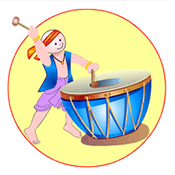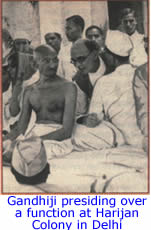
Dimdima
Online Children's Magazine from India

Dimdima
Online Children's Magazine from India
| Gandhi and Ambedkar |
|
Gandhiji visited England in 1931 to attend the second Round Table Conference
which was called to decide the future of India. The conference produced no
concrete results. Gandhiji met several people and addressed meetings pleading
India's case for freedom. |
Dr. Ambedkar was convinced that caste Hindus would not change their attitude
towards his people unless they raised their collective voice in protest. He
maintained that if his people had resisted the practice of untouchability, the
caste Hindus would not have been able to force untouchability on them. He urged
his followers to 'make the thoughtless think' and 'to make those who were
thoughtful to act in conformity with their thoughts.'
Dr. Ambedkar set out to empower the Depressed Classes and when caste Hindus
urged him not to press for a separate electorate, he laughed in their face and
wondered why those who had kept his people out of the Hindu mainstream for so
long were now beseeching them to stay within the Hindu fold.
 Explaining
why Gandhiji had to go on a fast unto death on the issue, the eminent
sociologist, Dr. M.S. Gore writes: "....... he (Gandhiji) had not been able to
change the attitude of the Hindu community towards the untouchables. Caught
between the orthodoxy of his own followers and the militant demands of the
newly–aroused untouchables, he had found no effective strategy."
Explaining
why Gandhiji had to go on a fast unto death on the issue, the eminent
sociologist, Dr. M.S. Gore writes: "....... he (Gandhiji) had not been able to
change the attitude of the Hindu community towards the untouchables. Caught
between the orthodoxy of his own followers and the militant demands of the
newly–aroused untouchables, he had found no effective strategy."
Gandhiji's fast stirred the conscience of the Hindu community. As the fast
progressed, temples began to throw open their doors to the Depressed Classes. At
the Benaras Hindu University, brahmins led by principal Dhruva, dined publicly
with street cleaners, cobblers and scavengers. In villages and towns,
untouchables were given access to wells. The practice of segregation of
untouchables and caste Hindus in classrooms was given up in many schools across
the country.
Dr. Ambedkar was concerned about Gandhiji's fast. In a statement, he said: "I
trust the Mahatma will not drive me to the necessity of making a choice between
his life and the rights of my people. For I can never consent to deliver my
people bound hand and foot to the caste Hindus for generations to come."
Mediators shuttling between Gandhiji and Ambedkar hammered out an understanding
between the two leaders. Dr. Ambedkar agreed to give up his demand for a
separate electorate and Gandhiji agreed to reservation of seats in the
legislature for the Depressed Classes.
The country heaved a sigh of relief when Gandhiji ended his fast on 26 September
1932.
Dimdima is the Sanskrit word for ‘drumbeat’. In olden days, victory in battle was heralded by the beat of drums or any important news to be conveyed to the people used to be accompanied with drumbeats.
Bharatiya Vidya Bhavan
K. M Munshi Marg,
Chowpatty, Mumbai - 400 007
email : editor@dimdima.com
Bharatiya Vidya Bhavan
505, Sane Guruji Marg,
Tardeo, Mumbai - 400 034
email : promo@dimdima.com
Dimdima.com, the Children's Website of Bharatiya Vidya Bhavan launched in 2000 and came out with a Printed version of Dimdima Magazine in 2004. At present the Printed Version have more than 35,000 subscribers from India and Abroad.